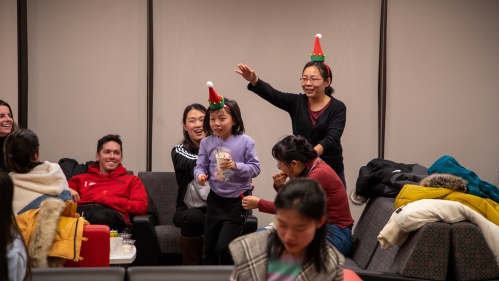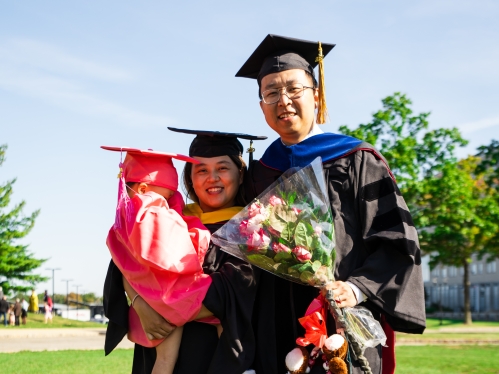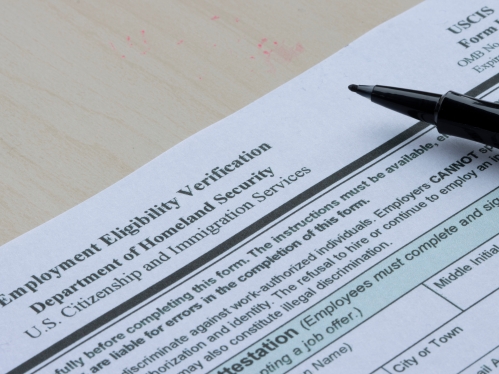
Dependents and Family
Dependents of International Students: Requesting F-2 or J-2 Documents
Dependents (spouse and unmarried children under 21 years of age) can accompany international students to Rutgers and the United States during the duration of the student’s studies. Dependents of F-1 or J-1 status students will have to enter the US on F-2 or J-2 visas.
If your family member intends to visit for a short period of time, we would advise you to apply for a B-2 (tourist visa) instead.

Accordion Content
-
Spouse or an unmarried child (under 21 years of age) of a primary F-1/J-1 visa holder. Dependents can enter the United States with the F-1 or J-1 visa holder or separately afterwards, but never prior to the arrival of F-1 or J-1 visa holder.
Their eligibility to stay legally in the U.S., as well as to extend their stay, is contingent upon the primary visa holder maintaining his/her legal status and extending his/her program in a timely manner.
F-2 or J-2 dependents may not remain in the United States after the F-1 or J-1 visa holder leave the country, unless the primary F-1 or J-1 visa holder’s absence is brief and temporary.
F-2 Dependents
- May study part-time only
- Must consult with the Rutgers Global–International Student and Scholar Services (ISSS) before planning to enroll full-time
- An F-2 child may study full-time study from kindergarten through twelfth grade
- Not eligible to work, or engage in any employment in the United States (including teaching assistantships) and are not eligible for a Social Security Number
- Must file IRS Form 8843 each year sometime between January 1 and June 15
- Must leave the United States within 60 days of the end of the F-1 program or when the F-1 student departs (whichever occurs first).
J-2 Dependents
- May study full time and work in the U.S.
- Must apply for work authorization from the USCIS before being employed
- Unemployed J-2 dependents must file the Form 8843 each year sometime between January 1 and June 15
- Employed J-2 dependents must file federal and state income tax with the IRS
- Must leave the United States within 30 days of the end of the J-1 program or when the J-1 visa holder departs (whichever occurs first)
-
- If your spouse will accompany you to the US, you must show additional financial documentation of $5,000 per year for living expenses. An additional $4,000 is required for each child.
- Proof of adequate health insurance for you and your dependent(s). Please see here for how you can meet the Rutgers Insurance requirements.
You must confirm your health insurance with one of the two options below:
- Rutgers health insurance
- Non-Rutgers health insurance. You must obtain a waiver if you choose to go with an external health insurance provider. See here more details for the Rutgers cost. Rutgers New Brunswick students: please contact Eirinn Jones, insurance coordinator, at eljones@global.rutgers.edu for any questions
- You will also need to pay a one-time Dependent Document Fee(s): $50 for a spouse and $25 for each child (paid in person by check or money order only)
-
Gather the necessary materials below:
- A scanned copy of your family member's biography and photo passport page
- A scanned copy of proof of funding for the primary F-1 or J-1 visa holder along with an additional $5,000 for spouse and/or $4,000 per child for living expenses. Please see the Certification of Funds for details.
- Proof of health insurance:
- Rutgers New Brunswick Students: If your dependents will not have health insurance coverage from Rutgers, scanned copy of proof of alternate adequate health insurance coverage.
- Rutgers Health Students: A scanned copy of proof of adequate health insurance coverage
- Complete the Request to Add an F-2/J-2 Dependent via the RGlobal Portal .
You'll need all the documents and information we've listed above in order to successfully complete the add a dependent request. This is a multiple submission form and you can add multiple dependents as part of one request.
-
-
Within five business days of receiving your complete request, we will issue you and your dependent(s) new documents. Once your documents are ready we will email you to confirm they are ready and provide further instructions on getting the F-2 or J-2 visa(s) for your dependent(s).
-
Receive the new document(s) via email.
-
Pay the Dependent fee.
-
If your spouse and/or child(ren) is not yet in the US, they will need to apply for an F-2 visa if you are in F-1 status or a J-2 visa if you are in J-1 status. They will need to apply for this visa in their home country. Mail the I-20 or DS-2019 with other supporting documents to your family member to apply for an F-2 or J-2 visa stamp at their local US consulate. Canadian citizens and Aruban citizens do not need to apply for a visa. Your dependent will then gain F-2 or J-2 status through entry to the United States by presenting their I-20/DS-2019, passport, and F-2/J-2 visa stamp (accompanied by any supporting documents) at the US port of entry.
-
If your spouse and/or child(ren) is currently in the US in another immigration status, they will either need to depart the US to then apply for a new visa at a US consulate outside of the US or apply to change their status in the US. If you have any questions on this step, please contact an international student adviser for a "change of status" appointment.
-
-
Once your dependents arrive in the United States or have officially changed their immigration status to F-2 or J-2, you must bring in their documents to complete the check-in process. We must review their documents and ensure their health insurance is active. Do not forget to check-in your dependent.
-
Raising a family is a deeply rewarding journey. At Rutgers, we recognize the unique challenges of balancing academic responsibilities, career goals, and home life—especially for international families. Navigating local childcare and school systems can be complex, and we’re here to help ensure your children are well supported.
Childcare Options
-
Private Daycare: Full-day care for infants and children younger than 5 years in a structured, nurturing environment. This is a common choice for families with very young children.
-
Aftercare Programs: Supervised care for school-aged children after the regular school day. Some schools offer private programs for a fee.
-
Temporary or As-Needed Care: Flexible, short-term childcare for occasional or emergency needs, often used during evenings, weekends, or after-school hours.
-
Summer Care: Schools are typically closed from mid-June to late August. Families may consider summer camps or other childcare options during this time.
Schooling Overview
Children in the U.S. are eligible for free public education starting at age 5. Here's a general breakdown of school levels:
-
Pre-School / Pre-K: Ages 3–4
-
Elementary School: Kindergarten through Grade 5 (Kindergarten enrollment requires children to be 5 years old by October 1)
-
Middle School: Grades 6–8
-
High School: Grades 9–12
Planning and Enrollment
Early planning is essential. Some preschools and daycares have waitlists, so advance registration is recommended.
Note: Be sure to review your child’s school or daycare calendar, as holidays and breaks may differ from Rutgers University’s academic calendar.
Essential Documents for School Registration
International families should prepare an example of the list below before arriving on campus to prepare for enrollment. Some may need to be translated into English:
-
Immunization records
-
Recent physical exam
-
Health insurance information
-
Enrollment forms
-
Emergency contacts and release authorization
-
Transportation/school bus details (if applicable)
-
Proof of income and/or residency
-
Parent photo ID
-
Previous school records (if applicable)
-
Child’s passport
School Assignment
-
Families living in Rutgers family housing (Marvin or Nichols Apartments) will attend Piscataway Township Schools.
-
Off-campus families should contact their local school district to determine school eligibility and enrollment procedures.
Budgeting for Childcare
Childcare in the U.S. can be costly. It’s important to choose options that align with your child’s age, your schedule, and your budget.
-
Full-Time Daycare (New Brunswick/Piscataway area): $1,150–$1,450/month
-
Before/Aftercare Programs: $160–$500/month
-
Summer Camps: $300–$500/week
Rutgers faculty and staff may be eligible to use a Dependent Care Flexible Spending Account (FSA) to offset childcare costs through employer contributions.
Additional Resources:
-
Rutgers University Supporting Your Family (For employees)
-
-
We encourage you to be supportive and prepared for your dependents to join you in the United States. Be patient, plan ahead, and have fun! Help your family members make friends and feel welcome by joining the International Women's Group (see below) and looking into other resources available. Be sure to have open communication with your family and discuss visa regulations and difference in lifestyle/cultures. Also be sure to research schools/daycare if your children will be joining you.
The International Women's Group (IWG) is a volunteer organization which was founded in 1988 by volunteers from the Rutgers community, with the support of Rutgers Global.
The IWG helps women, and their families adjust to New Jersey and the Rutgers community. We also support each other and share information about cultural adjustment, improving English skills, and other local activities. We do this by sharing our own backgrounds, cooking, and learning from each other. We explore ways to navigate the U.S. and Rutgers together with our families.
The group usually meets every Wednesday. Please see the Program Schedule for the locations and additional details.
Check-in: Dependents (including children) not arriving with the F-1 student or J-1 student must check in to Rutgers Global–International Student and Scholar Services within 10 days of their arrival to the United States. Contact ISSS for more detailed instructions.
Health Insurance: All F-1 or J-1 visa holders and their F-2 or J-2 dependents must maintain health insurance that meets Rutgers requirements while on Rutgers visa sponsorship
Travel: All F-1 or J-1 visa holders and their F-2 or J-2 dependents must obtain a travel signature before departing the United States after their arrival. F-2 and J-2 dependents may not remain in the United States if the F-1 or J-1 visa holder leaves the country, unless the primary F-1 or J-1 visa holder’s absence is brief and temporary. Contact us with questions.
Taxes: Dependents must file IRS Form 8843 each year sometime between January 1 and June 15. If a J-2 dependent has earned income, they are also required to file U.S. Federal and State taxes with their IRS Form 8843.
Departure: Dependents must notify Rutgers Global–International Student and Scholar Services if you need to leave the United States or change your visa status. Please note that F-2 visa holders are required to leave the United States within 60 days of the end of the F-1 program or when the F-1 student departs (whichever occurs first).
Study/Education: F-2 Dependents may study part-time only; you must consult with Rutgers Global–International Student and Scholar Services before planning to enroll full-time in study. An F-2 child may study full-time study from kindergarten through Grade 12. J-2 dependents may study full-time in or outside of Rutgers.
Employment: F-2 dependent spouses and children are not permitted to work under any circumstances. J-2 dependents may apply for employment authorization from USCIS; however, funds from J-2 employment may not be used to support the exchange visitor and his or her family. For more information, see the USCIS Application for Employment Authorization webpage.
Health Insurance: All F-1 or J-1 visa holders and their F-2 or J-2 dependents must maintain health insurance that meets Rutgers requirements while on Rutgers visa sponsorship.
Removal of F-2/J-2 Dependent: If the F-2/J-2 dependent changes his or her status or leaves (is leaving) the US, the F-1 or J-1 principal visa holder must have his/her name and dependent expenses removed from the form I-20/DS-2019. Please email ISSS at isss-students@global.rutgers.edu with the subject line: "Removal of F-2/J-2 Dependent."
FAQs
What if my spouse/child is already inside the U.S?
If a family member is currently on a different visa status (other than F-2 or J-2), they may need to change their visa status by exiting the U.S. and applying for an F-2 or J-2 visa, or they may need to apply to change their visa status. You will need to contact an international student or scholar adviser for a “change of status” appointment to discuss this further.
What if I am not married yet?
We can still issue the immigration document for your spouse, but you will need to show your marriage certificate to the visa officer when your dependent is applying for the F-2 or J-2 visa.
What if my family member will turn 21 years of age while they will be my dependent?
They may later need to apply to change their status to an independent visa status (like an F-1 or J-1 visa) or depart the United States and return home before they turn 21 years of age.
What if my F-2 spouse would like to study full-time within one year of their arrival? We recommend you carefully think about the purpose of your dependent’s visit. If your dependent really wants to study full time, they would be best to apply for their own F-1 visa. If they want to study full-time after joining you as an F-2 dependent, we recommend they apply for the F-1 visa abroad, compared to applying for a change of status within the United States.
Dependents of International Faculty & Scholars
International faculty and scholars can be accompanied to the U.S. by their spouse and unmarried children (under the age of 21). Please find below more information on the related processes, requirements, and resources for dependents of international faculty/scholars

J-2 Dependents
J-1 exchange visitors can bring their spouse and unmarried children (under the age of 21) with them to the United States as dependents on J-2 visas. J-2 status is dependent on the maintenance of the J-1 exchange visitor’s status.
-
J-1 exchange visitors must show proof of sufficient funds to support their living expenses as well as those of their dependents during their stay in the U.S. Proof of funding for J-2 dependents can come entirely from the J-1 exchange visitor’s personal funds. Please find all funding requirements here.
-
If the dependents will accompany the J-1 exchange visitor at the start of the program, the J-1 exchange visitor can add their dependents’ information in the initial J-1 application. The Forms DS-2019 for J-2 dependents will be issued together with the DS-2019 for the J-1 exchange visitor.
If a J-1 exchange visitor wishes to bring their J-2 dependent(s) to the U.S. after starting their program, they must first request a Form DS-2019 for their dependent(s). To begin this process, the exchange visitor must contact Rutgers Global – ISSS International Faculty and Scholar Services and prepare to submit the following via the RGlobal portal:
-
Copy of J-1’s passport and J-2 dependents’ passports
-
Bank statement, showing proof of adequate personal funding for dependents
-
Proof of health insurance for dependents
-
Payment of International Record Maintenance Fee ($50 for spouse and $25 per child)
Once these documents have been submitted and approved, J-1 exchange visitors will receive the Form DS-2019 for their dependents’ visa applications. Then, the J-2 dependents must pay the I-901 SEVIS fee and apply for a J-2 visa stamp at a consular post outside of the U.S.
*Please note that Canadian citizens do not need to apply for a J-2 visa stamp at a U.S. consular post. They will gain J-2 status through entry to the U.S. by presenting their passport, Form DS-2019 and I-901 payment receipt at the U.S. port of entry.
-
-
-
Check-in: The J-1 exchange visitor must include the dependents’ information during check-in if arriving together. If J-2 dependents arrive at a later time, the J-1 exchange visitor must contact Rutgers Global – ISSS International Faculty and Scholar Services immediately after their arrival to check-in their family members.
-
Health Insurance: All J-1 exchange visitors and their J-2 dependents must maintain health insurance that meets Rutgers requirements while on Rutgers’ visa sponsorship.
-
Travel: All J-1 exchange visitors and their J-2 dependents must receive a travel signature on their Form DS-2019 before traveling outside of the U.S. To receive the travel signature for J-2 dependents, the J-1 exchange visitor must first contact Rutgers Global – ISSS International Faculty and Scholar Services. If the J-1 exchange visitor leaves the country, J-2 dependents cannot remain in the U.S. unless the J-1 exchange visitor’s absence is brief and temporary.
-
Study/Education: J-2 dependents (spouse and / or unmarried children under the age of 21) may study full-time or part-time at Rutgers or other institutions.
-
Employment: J-2 dependents may apply for employment authorization from USCIS. However, funds from J-2 employment may not be used as a primary means of supporting the exchange visitor and their family.
-
Taxes: J-2 dependents must file IRS Form 8843 each year at any time between January 1 and June 15. If a J-2 dependent has earned income, they are also required to file U.S. Federal and State taxes in addition to filing IRS Form 8843.
-
Networking and Social Activities: Networking opportunities for J-2 spouses can be found here. For further information on social activities, please check the last page of the Pre-Arrival Resources brochure.
-
Departure: J-1 exchange visitors must notify Rutgers Global – ISSS International Faculty and Scholar Services if their J-2 dependents need to leave the United States or end their visa status. IFSS will then provide further instructions.
-
H-4 Dependents
H-1B employees can bring their spouse and unmarried children (under the age of 21) with them to the United States as dependents on H-4 visas. H-4 status is dependent on the maintenance of the H-1B employee’s status. It is the responsibility of the H-1B employee to ensure that their dependents maintain valid immigration status in the U.S. H-4 dependents are not sponsored by Rutgers.
-
If dependents are currently abroad, they can use the H-1B employee’s I-797 approval information to apply for an H-4 visa at a U.S. consular post outside of the U.S. Upon arrival on the H-4 visa, they will be granted H-4 status. All H-4 dependents should check their Form I-94 arrival record to verify that they have been properly admitted in H-4 status and their duration of authorized stay.
If dependents are currently residing in the U.S. in a different valid nonimmigrant immigration status (i.e., J-2, F-2, etc.), they may be eligible to apply for a change of status within the U.S. by filing Form I-539 with U.S. Citizenship & Immigration Services. It is the responsibility of the foreign national to prepare and submit the form in a timely manner. The Form I-539 application can be concurrently filed with an H-1B petition. As a courtesy, Rutgers Global – ISSS International Faculty and Scholar Services will enclose the Form I-539 application with an H-1B petition. However, Rutgers Global – ISSS International Faculty and Scholar Services is not authorized to review or provide legal advice relating to the Form I-539 or supporting documents.
If the H-1B employee extends their H-1B status, the dependents must also extend their status by submitting a Form I-539 application. This should be filed concurrently with the H-1B extension.
-
H-4 dependents are eligible to study in the U.S. (full-time or part-time). Children automatically lose H-4 status at the age of 21. H-4 children approaching the age of 21 should speak with an immigration lawyer about options for remaining in the U.S.
-
H-4 dependents are generally not authorized to work in the U.S. In some cases, H-4 spouses may be eligible to apply for work authorization. More information is available here. If an H-4 spouse has questions about their eligibility, they should consult with an immigration lawyer.

